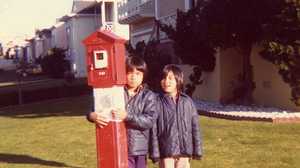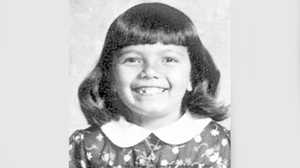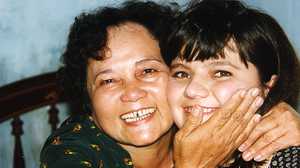Do Huu Vinh and his son, Do Trong Tinh
When Heidi Bub was growing up in Pulaski, Tennessee, she knew nothing of the history of her family in Vietnam. She had been born to Mai Thi Kim in Danang in 1968. Her natural father was an American in the U.S. Navy who was stationed at the base where Kim worked during the war. But in the early sixties, Mai Thi Kim had met, fallen in love with, and married, Do Huu Vinh, a tailor from a village near Danang, then South Vietnam.

In 1965 Do Huu Vinh and Mai Thi Kim were living with their three children in the village of An Hai, outside of Danang, when Vinh received a draft call from the South Vietnamese army of Ngo Dinh Diem's government. He instead chose to join the National Liberation Front, an organization of South Vietnamese Communists which was fighting the repressive, U.S.-backed regime of Diem. This conflict would be the final chapter in Vietnam's long struggle for independence.
Ten years later, Vinh returned to his family on April 10, 1975. His family organized a tribunal, where they accused his wife Kim of being a prostitute, because she had borne Mai Thi Hiep out of wedlock with an American soldier. (Hiep had been sent to the U.S. for adoption as part of Operation Babylift.) They urged Vinh to leave her.
Vinh refused to listen to his parents. He defended Kim, saying that she had had the affair because she had needed help supporting their children. Vinh did not blame Kim personally, but the difficulties of the war: "I thought whether she had a child or not, I did leave her to go and liberate the nation. ... When our nation was liberated and our country was united, my duty was fulfilled. I returned to provide comfort for my wife and my children, to heal the wound of war," Vinh said.
Had Kim not sent little Hiep to the United States, Vinh said he would have raised her as his own child. "When we fought, we fought against adults," he said. "She was only a child."
While Vinh was fighting with the National Liberation Front, his son Do Trong Tinh helped take care of his younger siblings, including his half-sister Hiep. When Kim was away at work, Tinh cleaned the house, bathed his sisters, and cooked lunch for them. After Hiep was born, Tinh's friends at school teased him about his mother. But he was never angry with her. "I only felt sad for my life," said Tinh. "I love my mother very much and never said anything because she always took care of her children, even in poverty."
Vinh's decision to join the NLF made life very hard for the family. "Back then, our family was like a boat heading toward a waterfall," Tinh said. "We had no control, and could just be swept away. When I went to the beach, the other kids looked so happy to have both parents."

Tinh remembers that "there was no day that the police did not come to our house." The family was forced to move from place to place. When Kim started working at the American base, things became easier.
As the North Vietnamese advanced on Danang and it was clear that the war was ending, the family began to worry about their "mixed kid," Hiep. Tinh recalls that his mother wanted to send Hiep away because she was afraid that something terrible would happen.
Tinh welcomed his father's return, but because Vinh had been away so long Tinh did not feel close to him. At the family meeting where Vinh's parents encouraged him to leave Kim, Tinh argued that his mother had taken care of the family for so long in such difficult circumstances that Vinh should return and reunite the family. Vinh and Kim chose to stay together.
In the years following the war, Tinh continued his studies, then began working at a rubber factory. In the 1980s, he travelled to Czechoslovakia to study. He liked Czechoslovakia at first, but said, "The more I studied, the more I knew, the less I liked it... Those Westerners kept rubbing my hair and called me 'black hair short nose' and called me 'di-gan' (vagabond)... The more I learned, the angrier I was." He returned to marry and settle in Danang.
Tinh knew that his mother wanted to find her daughter Hiep, but did not believe she ever would. He believed that too many years had passed. When he went to the airport to be reunited with his little sister he was overcome with emotion. He said, "... I could be considered the second mother to Hiep; I took care of her from eating to bathing and washing."
When Heidi and her Vietnamese family came into conflict near the end of her visit, Tinh found it hard to understand her point of view. He had requested she assume filial responsibility and help support their mother; Heidi had declined. "The only thing I regret was that as a Vietnamese, I thought what I said was normal. But for an American, it was a shock. This is very common in Vietnam. In a family, if you're better off... you might help us out. But Hiep couldn't understand that."







